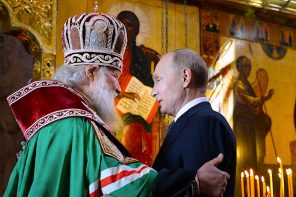The Christian group who sent comfort dogs to support mourners in the wake of the attack on a gay nightclub in Orlando acted with compassion—but behind the healing gesture lies a potentially hurtful message for LGBTQ people.
Pointing that out might seem, of course, a little ungrateful. After all, pictures of these furry friends with their handlers offering tender assurances to the traumatized seems a fitting rebuke to the targeted hate that exploded at Pulse. Whether posed in front of first responders or under the caresses of anonymous heartbroken souls, the canine images beckon captioning from Lin-Manuel Miranda: “Love is love is love is love is love!”
But doctrinal statements from the group’s parent organization complicate this feel-good story. The comfort dogs are a part of the ministry of Lutheran Church Charities, an arm of the Lutheran Church-Missouri Synod (LCMS), which calls homosexuality a “profoundly unnatural” orientation, and “recognizes homophile behavior as intrinsically sinful.”
Hard to imagine that language framed with a rainbow filter.
Not surprisingly, then, Nadia Bolz-Weber—the most recognizable face of the more liberal expression of Lutheranism in the United States, The Evangelical Lutheran Church of America—has referred to the LCMS as “a rather sectarian and fundamentalist part of the Lutheran family tree.”
Still, the theology of sexuality of the LCMS bears resemblance to that of a far wider church family than “sectarian” might suggest. The LCMS are in step with other conservative Protestants, Catholics, and Orthodox Christians who seek to temper official theological condemnation of gay sex with a wholehearted and public demonstration of love for gay people.
For writer and LGBTQ advocate Dan Savage, this isn’t good news. Worse than a warmed-over recipe of “hate the sin, love the sinner,” he detects poison in pretty packaging.
Consider, for instance, Savage’s opinion of the Marin Foundation, an organization that seeks to “create bridges between the LGBTQ community and communities of faith.” For many people, the Marin Foundation provokes a similar emotional response to that of the more recent images of comfort dogs in Orlando. For instance, Buzzfeed featured the group at the top spot of an article entitled “21 Images That Will Restore Your Faith in Humanity.”
The photos show Marin Foundation members holding contrite placards at a pride festival–including “I Used to Be a Bible-Banging Homophobe. Sorry!”—before being enveloped in bear-hugs from scantily clad paradegoers. (It seems one of them even got a book deal from it?)
Savage, though, perceives menace in those embraces. He points out that
Andrew Marin, the group’s founder and public face, has urged his followers to target Christian teenagers struggling with ‘same sex attraction’ because they’re easier to talk out of being gay. Marin has refused to say that gay sex isn’t a sin, and he seems to believe that gay people can change their sexual orientation. The more you learn about the Marin Foundation, the more it looks like Westboro Baptist in the drag of false contrition. God hates you—now with hugs!
That is a blistering critique for an organization that—unlike the Catholic Church, the Eastern Orthodox Church, or the Lutheran Church-Missouri Synod (to give just one of many conservative Protestant examples)—does not specify whether they think LGBTQ sex is sacred or sinful. Marin, for his part, responded with a detailed explanation of his peacemaking ethos, bolstered by numerous testimonies of support from LGBTQ people.
Nonetheless, Savage finds Marin’s ambiguity scary and one wonders whether Savage’s view will draw even wider company in the face of devastation.
In the Gospel of Luke in the New Testament, Jesus draws wide boundaries of solidarity: “Whoever is not against us is for us.” (Luke 9:50) In the Gospel of Matthew, and in a different instance, however, Jesus closes ranks: “Whoever is not with me is against me, and whoever does not gather with me scatters” (Matthew 12:20). The attack at Pulse may encourage LGBTQ people to similarly restrict terms of solidarity.
If Christians with a conservative view of sexuality and a love for the LGBTQ community once expected to be patted on the back for offering friendlier approaches than the worst of the religious right, or the unabashed hate speech of the Westboro contingent, they may now find attempts at solidarity increasingly out of their reach.
For one thing, it is appearing more possible that the perpetrator of evil in Orlando was a self-hating and closeted man, perhaps somewhere on the gay to bisexual spectrum, whose self-declared affinity for Islamic terrorist groups may have both reflected and reinforced his shame and rage about those feelings. In this light, perhaps LGBTQ people will join Savage in more pointedly and vigorously denouncing the non-violent religious voices that have the potential to set others on a vicious shame cycle by suggesting there is something wrong—on an eternal, sacred scale—with diverse and loving expressions of sexuality.
It is also possible, though, that some LGBTQ communities will continue to engage with conservative religious people who believe their sex lives are sinful, but who sincerely want to stand against violence and political oppression. If LGBTQ people extend that dialogue, they may find themselves more often in the position of converting others, rather than the more familiar receiving end of conversion attempts.
After the terror at Pulse, a Nova Scotian man wrote a confession of his religiously-based homophobia to a gay salon owner, detailing how the attack had radically rewired his thoughts and feelings about him and all LGBTQ people. Other conservative religious people who never harbored that hatred, may be provoked to rewrite, or at least reconsider, their theologies and politics of sexuality.
Regardless, a much wider swath of people now realize the search for redeeming and honest paths of embrace can be, as LGBTQ people have always known, a matter of life and death.





